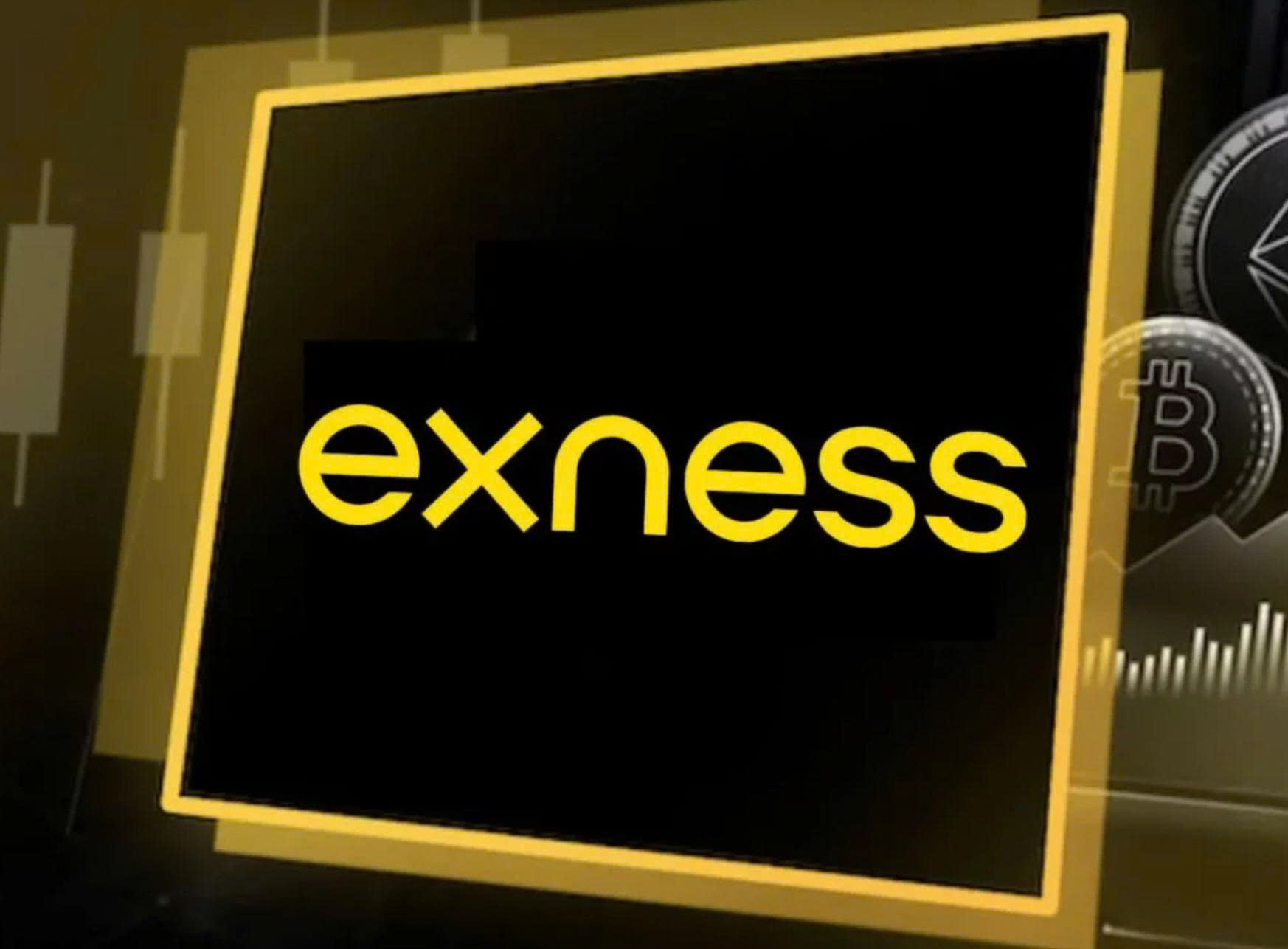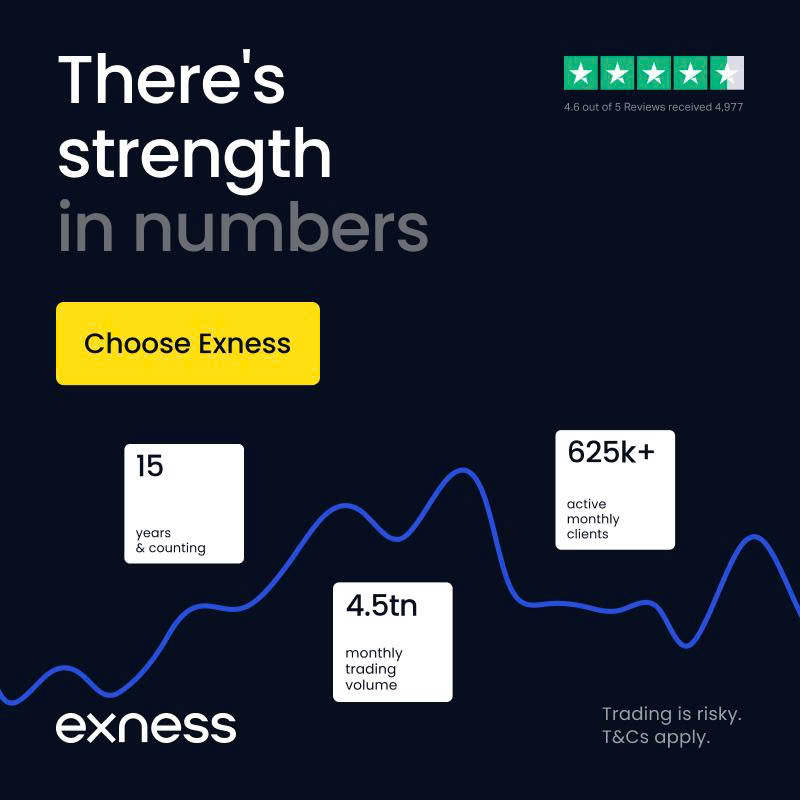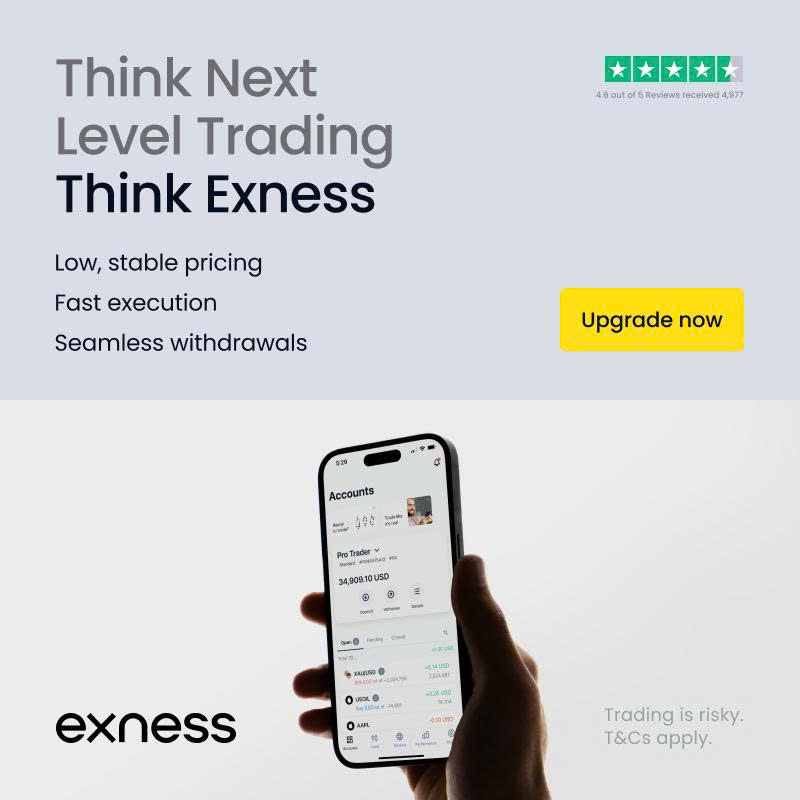
7 minute read
Exness vs BDSwiss: Which Forex Broker Should You Choose in 2025?
from Exness, BDSwiss
If you're diving into the world of forex trading and wondering whether to go with Exness vs BDSwiss, you’re not alone. Choosing the right broker can make or break your trading experience, so let’s cut to the chase. Both Exness vs BDSwiss are well-known names in the forex market, but they cater to slightly different needs. Exness is often praised for its tight spreads and high leverage, while BDSwiss shines with its user-friendly platforms and diverse asset offerings. By the end of this article, you’ll have a clear picture of their strengths, weaknesses, and which one suits your trading style best.

✅ Trade with Exness now: Open An Account or Visit Brokers 👈
In this guide, we’ll compare Exness vs BDSwiss across key factors like regulation, fees, platforms, trading instruments, and customer support. Whether you're a newbie or a seasoned trader, this breakdown will help you make an informed decision. Let’s dive in!
1. Overview: Exness vs BDSwiss at a Glance
Before we get into the nitty-gritty, here’s a quick snapshot of both brokers to set the stage.
· Exness: Founded in 2008, Exness is a global broker headquartered in Seychelles. It’s known for low spreads (starting from 0.0 pips), high leverage (up to 1:2000 in some regions), and a focus on transparency. Exness is regulated by multiple authorities, including CySEC (Cyprus) and FCA (UK), making it a trusted choice for traders worldwide.
· BDSwiss: Established in 2012, BDSwiss is based in Mauritius and regulated by bodies like FSC, FSA, and FSCA. It offers over 1,000 trading instruments and a variety of account types with a low minimum deposit ($10). However, some traders have raised concerns about withdrawal delays, which we’ll address later.
Both brokers have their strengths, but your choice depends on what you prioritize—low costs, platform flexibility, or asset variety. Let’s break it down further.
2. Regulation and Trustworthiness
Trust is everything when you’re handing over your hard-earned money to a broker. So, how do Exness vs BDSwiss stack up in terms of regulation?
· Exness: Exness is regulated by top-tier authorities like CySEC (Cyprus), FCA (UK), and FSA (Seychelles). It has a strong reputation, with a Traders Union Overall Score of 9.4/10, reflecting high reliability. Exness also segregates client funds, ensuring your money is safe even if the broker faces issues. Many traders report positive experiences, with fast withdrawals and transparent operations.
· BDSwiss: BDSwiss is regulated by FSC (Mauritius), FSA (Seychelles), and FSCA (South Africa). While these are reputable regulators, they’re considered less stringent than CySEC or FCA. BDSwiss has a Traders Union Score of 5.66/10, indicating moderate risk. Unfortunately, some user reviews on platforms like Trustpilot highlight withdrawal delays and poor customer service, raising red flags for some traders.
Verdict: Exness takes the lead here due to its stronger regulatory framework and better reputation for reliability. If safety and trust are your top priorities, Exness is likely the safer bet.
3. Fees and Spreads
Nobody wants their profits eaten up by high fees, so let’s talk costs.
· Exness: Exness is a favorite among cost-conscious traders. It offers variable spreads starting as low as 0.0 pips on certain accounts (like the Raw Spread account). There are no hidden fees, and commissions are low (e.g., $3.5 per lot on some accounts). Instant deposits and withdrawals are a big plus, allowing you to access your funds quickly.
· BDSwiss: BDSwiss also uses variable spreads, starting from 0.1 pips on premium accounts. However, it charges an inactivity fee, which can be a downside for part-time traders. Some users have reported unexpected fees in the fine print, so you’ll want to read the terms carefully. Withdrawal times can vary, with some complaints about delays lasting weeks or even months.
Verdict: Exness wins for lower spreads and faster withdrawals. BDSwiss’s inactivity fees and reported withdrawal issues make it less appealing for cost-conscious traders.

✅ Trade with Exness now: Open An Account or Visit Brokers 👈
4. Trading Platforms
Your trading platform is your gateway to the markets, so it needs to be intuitive and reliable.
· Exness: Exness supports MetaTrader 4 (MT4), MetaTrader 5 (MT5), and its own web-based platform with social trading features. These platforms are industry standards, offering one-click trading, trailing stops, and pending orders. The Exness mobile app is highly rated for its clean interface and real-time updates, making it great for trading on the go.
· BDSwiss: BDSwiss also offers MT4, MT5, and its proprietary WebTrader platform. The WebTrader is particularly user-friendly for beginners, with a sleek design and easy navigation. Like Exness, BDSwiss supports mobile trading, but some users note that the platform can feel less responsive compared to MT4/MT5.
Verdict: It’s a tie. Both brokers offer MT4 and MT5, which are robust and widely used. BDSwiss’s WebTrader is a nice touch for beginners, while Exness’s social trading feature appeals to those who want to follow experienced traders.
5. Trading Instruments
Variety is the spice of trading. Let’s see what markets you can explore with each broker.
· Exness: Exness offers a wide range of instruments, including forex, gold, silver, CFDs, oil, stocks, indices, metals, energies, and cryptocurrencies. This diversity allows traders to explore multiple markets and diversify their portfolios.
· BDSwiss: BDSwiss goes big with over 1,000 instruments, covering forex, cryptocurrencies, indices, commodities, stocks, and ETFs. This makes it a great choice for traders who want access to a broad range of assets beyond forex.
Verdict: BDSwiss edges out slightly due to its larger selection of trading instruments. If you’re looking to trade beyond forex, BDSwiss offers more options.
6. Account Types and Minimum Deposits
Flexibility in account types and low entry barriers are key for traders at all levels.
· Exness: Exness offers several account types, including Standard, Pro, Raw Spread, and Zero accounts. The minimum deposit starts at $1 for Standard accounts, making it accessible for beginners. Professional accounts may require higher deposits (e.g., $200), but they come with tighter spreads and lower commissions.
· BDSwiss: BDSwiss provides six account types, including Classic and Cent accounts with a low minimum deposit of $10. This is great for beginners or those testing the waters. However, higher-tier accounts require larger deposits, and some features (like higher leverage) are region-specific.
Verdict: Exness has a slight edge with its $1 minimum deposit, but BDSwiss’s low $10 entry point is also beginner-friendly. It’s a close call.
7. Customer Support
Good customer support can save you from a lot of headaches, especially when issues arise.
· Exness: Exness offers 24/7 multilingual support via live chat, email, and phone. Traders praise its prompt and professional responses, with many issues resolved quickly. The broker also provides extensive educational resources and market analysis tools.
· BDSwiss: BDSwiss offers 24/5 support (excluding weekends) in multiple languages. While some traders report positive experiences with polite and helpful staff, others complain about slow responses and unresolved withdrawal issues.
Verdict: Exness takes the win for its round-the-clock support and better track record in resolving issues.
8. Pros and Cons Summary
To make things crystal clear, here’s a quick rundown of each broker’s strengths and weaknesses.
ExnessPros:
Tight spreads (from 0.0 pips)
High leverage (up to 1:2000 in some regions)
Fast and reliable withdrawals
Strong regulation (CySEC, FCA)
Low minimum deposit ($1)
Cons:
Fewer trading instruments compared to BDSwiss
High leverage may be risky for inexperienced traders
BDSwissPros:
Over 1,000 trading instruments
User-friendly WebTrader platform
Low minimum deposit ($10)
Suitable for beginners and pros
Cons:
Withdrawal delays reported by some users
Weaker regulation compared to Exness
Inactivity fees
9. Which Broker Should You Choose?
So, Exness or BDSwiss? It depends on your trading goals:
· Choose Exness if: You prioritize low spreads, fast withdrawals, and strong regulation. It’s ideal for forex traders who want a reliable, cost-effective broker with a solid track record. Exness is also great for high-leverage trading, but use caution if you’re a beginner.
· Choose BDSwiss if: You want access to a wider range of trading instruments and a beginner-friendly platform like WebTrader. BDSwiss is a good fit for traders who value asset diversity and are okay with potentially slower withdrawals.
10. Final Thoughts
Both Exness vs BDSwiss have their merits, but Exness generally comes out ahead due to its lower costs, stronger regulation, and better reputation for reliability. However, BDSwiss’s extensive asset offerings and user-friendly platform make it a strong contender for traders who want variety. Ultimately, your choice should align with your trading style, budget, and priorities.
✅ Trade with Exness now: Open An Account or Visit Brokers 👈
Read more:

